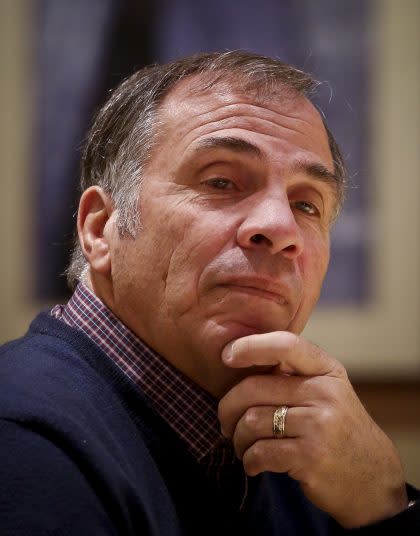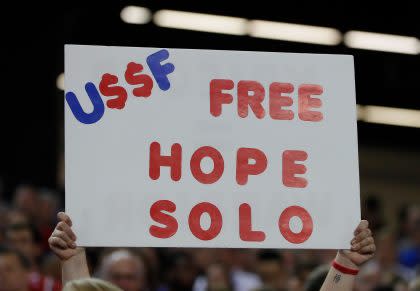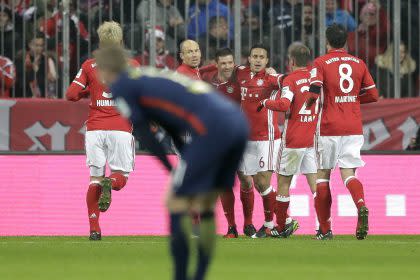Here's our starting XI of soccer storylines we're watching for 2017
A lot happened in 2016. And that’s just in soccer. FIFA got its first new president, Gianni Infantino, in almost two decades. We saw an upset-happy Euro 2016. Jurgen Klinsmann was fired as United States men’s national team head coach after a woeful start to the final round of World Cup qualifying. The women’s national team had its worst performance at a major tournament ever, crashing out of the quarterfinals of the Rio Olympics.
[ FC Yahoo: Defining success for Bruce Arena’s USMNT in 2017 ]
Regrettably, 2017 is the year that comes around once in every four when there’s no World Cup, no Women’s World Cup and no Euro. There is, however, a Gold Cup, the climax of World Cup qualifying and a Confederations Cup to look forward to, as well as a 2017 under-20 World Cup.
Here are the big storylines we’re keeping our eye on over the course of the next 12 months:

How will Bruce Arena do in his second term with the U.S. men’s national team and in his third World Cup cycle?
With Klinsmann gone after a half decade of big promises and high-profile friendly wins but something close to stagnation – or worse – in the actual results that mattered, Arena has been called back to the managerial job he held from 1998 through 2006.
He’s got a lot of pieces to sweep up and glue back together in some fashion, as the latter Klinsmann days consisted mostly of disjointed performances by an uninspired team that felt stale and wedged into shapes that didn’t fit it. Arena is a strong team-builder and, while he may not make grand proclamations about playing modern attacking soccer, he has a long record of getting results.
If he can quickly coax some cohesion on the field from whatever team he puts together – he has said it won’t look all that different from Klinsmann’s, personnel-wise – Arena should be able to turn around the qualifying campaign and deliver a decent performance at the off-year Gold Cup.
If not, there will be more trouble ahead.
Can Christian Pulisic have another year like 2016?
In the year that the Pennsylvania-native legally became an adult, he also turned in one of the best years any American outfield player has ever had in Europe. That may sound outlandish, considering the great campaigns Clint Dempsey, Brian McBride, Michael Bradley, Claudio Reyna, Carlos Bocanegra and others have had overseas. But consider that Pulisic was a fairly regular starter for Borussia Dortmund, currently a bigger club than any of those other men played for.
In 2016, Pulisic made 30 appearances for Die Borussen in the Bundesliga and the Champions League, showing well in an away game at Real Madrid. He even scored four goals and set all kinds of records for being the youngest at doing assorted Bundesliga and U.S. national team things. At his age, regression and struggle is to be expected at some point. Will that be in 2017? Or can he keep this momentum up and cement himself as one of the most promising young players in Europe?
When will the U.S. women’s national team hash out a new CBA?
The old collective bargaining agreement – or, to be precise, the memorandum of understanding that extended the even older CBA – expired Dec. 31, and U.S. Soccer and the USWNT are now without working terms. The old arrangements apparently remain in force until a new deal is reached, but the players have made no secret of their wish for raises. They would like to be paid what the men’s team gets – a tad more, albeit with less security and no benefits – even though the payment structures are quite different. To that effect, the team filed last year a complaint with the federal Equal Employment Opportunity Commission, which should rule in the coming months.
With the SheBelieves Cup slated for March, a work stoppage seems unlikely. But this fight, which the women have sought to litigate in public, might get uglier before it gets resolved.

And what will happen with Hope Solo, the NWSL and Alex Morgan?
Hope Solo is banned from the national team until late February but has already declared she’d like to return even though her contract was terminated. Are there any circumstances under which she might be allowed to come back, in spite of the long rap sheet that got her kicked off the team in the first place?
Meanwhile, the lack of a CBA raises questions for the National Women’s Soccer League. Will its U.S. national team stars play, since their league contracts are tied into their federation deals? And if so, how many of the stars will actually be around? Alex Morgan and Crystal Dunn have already signed deals to play at Olympique Lyonnais and Chelsea, respectively, meaning they’ll miss a chunk of the season.
How will the battle of the managers play out in the Premier League?
The English Premier League is loaded with stars, but with just about every big name in management now active in the world’s richest league, coaches have in a lot of ways overshadowed the talent actually on the field. With Jose Mourinho at Manchester United, Pep Guardiola at Manchester City, Jurgen Klopp at Liverpool, Antonio Conte at Chelsea, Mauricio Pochettino at Tottenham Hotspur and good old Arsene Wenger – who has an expiring contract after two decades in charge – at Arsenal, who will win out?
Mathematically, five of those managers won’t be able to win the title, and two will miss out on the Champions League. How will that affect the balance of power, not to mention their job security?
Will Infantino finally bring about change at FIFA?
After his surprising ascent to the highest office in soccer on a platform of change and transparency, Infantino hasn’t yet delivered much to support that promise. In fact, he may have accomplished the opposite. And he’s pushing to expand the World Cup from 32 teams to 40 or 48, which may or may not be good for the sport.
Will we get more clarity on the 2026 World Cup?
The deadline to bid for the next available World Cup isn’t until December 2018, but the U.S. is in pole position and probably would be served well by announcing early, lest anybody else gain momentum. A double bid with Canada or Mexico is quite possible. And so is a triple bid with both. It would make sense, given the potential expansion to 40 or 48 teams and Infantino’s enthusiasm for multi-nation World Cups. Teaming up with the biggest potential rivals would pretty much lock up the hosting rights, since it is widely believed that it’s CONCACAF’s turn.
Will the balance of power shift from Barcelona back to Real Madrid?
Zinedine Zidane’s surprising success in the capital has Real ahead in La Liga and looking like a strong contender for a third Champions League trophy in four years. Meanwhile, in Catalonia, Barca is coming off a treble and a double in the last two years, yet somehow the impression exists that Luis Enrique isn’t getting the most out of his squad. This would only be exacerbated if Barca doesn’t win the league for a third year in a row.

Can Borussia Dortmund finally muster a real threat to Bayern Munich again?
Speaking of domestic dominance, Bayern has won the Bundesliga four seasons in a row and has re-taken the lead to end 2016 in first place. Since only Dortmund is believed to be able to mount a consistent challenge, it would be helpful if Thomas Tuchel’s team stopped spilling points. The Bavarian club itself says it all the time: It would be good for the league for its rivals to be more competitive.
But since Dortmund sit in sixth place, and RB Leipzig surely can’t keep up its blistering form as a newly promoted team, Bayern may run the show for a while longer.
Is Paris Saint-Germain’s dynasty over?
The Parisians won Ligue 1 four years in a row – coinciding precisely with Zlatan Ibrahimovic’s tenure at the club – but have slipped behind Nice and Monaco so far this season. Could it be that the runaway champions from the last few years have finally met their match in a league they were believed to be capable of dominating for a decade?
And what about the Chinese Super League?
If the rise of Chinese soccer and its expensive mega-transfers for one European-based star after another didn’t catch your eye in 2016, you probably weren’t paying very close attention. Chances are that this injection of cash into the game, drawing talent to China, will have a profound effect on the global game. But just how much of a role will the CSL play?
Will it remain a backwater with a low playing level for big stars like the leagues in Qatar, the United Arab Emirates and Saudi Arabia have long been? Or will it develop into something sustainable and serious, like Major League Soccer is doing?
Leander Schaerlaeckens is a soccer columnist for Yahoo Sports. Follow him on Twitter @LeanderAlphabet.


